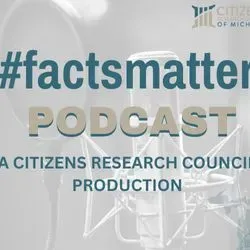
10 October 2025
Michigan’s “potholes and pot” budget tackles how we fund roads and how we use marijuana tax revenue
#FactsMatter, the Citizens Research Council of Michigan podcast
About
Guy Gordon and Bob Schneider, Citizens Research Council’s senior research associate for state affairs, look at what is in the final state budget, signed into law this week by Governor Whitmer, from both the 30,000 foot level and the nitty gritty level, digging into some of the elements that didn’t receive much attention.
Calling it the Michigan ‘Potholes and Pot’ budget, Guy and Bob discuss how the budget finally tries to start addressing how Michigan funds roads by removing the confusing sales tax on gasoline, so those dollars now go directly where they belong: fixing roads.
But that change also cuts off money that used to flow to schools and local governments.
Backfilling the School Aid Fund
Schools were mostly held harmless, but because some of their funding was shifted to universities, K–12 districts end up about $400 million short.
No Backfill for Cities, Villages and Townships
Local governments weren’t so lucky — they’re losing around $93 million, which could mean tighter budgets for public safety and local services.
This equals a 5–10% reduction, depending on the community.
Impact varies: Townships may be more affected since revenue sharing can be a large portion of their budget.
Some public safety grants (~$42M) were added, but they’re targeted and don’t offset the broader cuts.
Budget Gimmicks and Sustainability
The good news? No budget gimmicks this year. It’s considered honest and sustainable, with no major short-term gimmicks like early payments or delayed obligations, even as COVID-era one-time funds fade away. Michigan budgeted one-time funds carefully.
While some lawmakers claim the budget is smaller, it’s actually slightly larger once you count all spending — around $84 billion total.
On the process side, there was real progress: lawmakers made earmark requests public and transparent. But the process was still rushed, and there was a big miss — the state skipped the usual public revenue estimate, leaving a major transparency gap.
In short: Michigan’s budget is cleaner, more sustainable and fixes old problems than in past years. But leaves a few new ones to deal with in coming years. The budget solves long-standing issues around fuel taxes and revenue use. Schools were protected, but took a secondary hit from a university funding shift.
The budget is sustainable, transparent, and returns to normal size relative to the state’s economy.
Calling it the Michigan ‘Potholes and Pot’ budget, Guy and Bob discuss how the budget finally tries to start addressing how Michigan funds roads by removing the confusing sales tax on gasoline, so those dollars now go directly where they belong: fixing roads.
But that change also cuts off money that used to flow to schools and local governments.
Backfilling the School Aid Fund
Schools were mostly held harmless, but because some of their funding was shifted to universities, K–12 districts end up about $400 million short.
No Backfill for Cities, Villages and Townships
Local governments weren’t so lucky — they’re losing around $93 million, which could mean tighter budgets for public safety and local services.
This equals a 5–10% reduction, depending on the community.
Impact varies: Townships may be more affected since revenue sharing can be a large portion of their budget.
Some public safety grants (~$42M) were added, but they’re targeted and don’t offset the broader cuts.
Budget Gimmicks and Sustainability
The good news? No budget gimmicks this year. It’s considered honest and sustainable, with no major short-term gimmicks like early payments or delayed obligations, even as COVID-era one-time funds fade away. Michigan budgeted one-time funds carefully.
While some lawmakers claim the budget is smaller, it’s actually slightly larger once you count all spending — around $84 billion total.
On the process side, there was real progress: lawmakers made earmark requests public and transparent. But the process was still rushed, and there was a big miss — the state skipped the usual public revenue estimate, leaving a major transparency gap.
In short: Michigan’s budget is cleaner, more sustainable and fixes old problems than in past years. But leaves a few new ones to deal with in coming years. The budget solves long-standing issues around fuel taxes and revenue use. Schools were protected, but took a secondary hit from a university funding shift.
The budget is sustainable, transparent, and returns to normal size relative to the state’s economy.